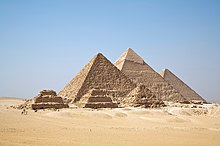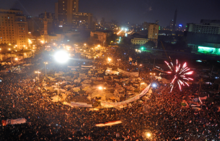IGibhithe
| iRiphabliki Arabhu weGibhithe جمهورية مصر العربية Ǧumhūriyyat Maṣr al-ʿArabiyyah |
||||||
|---|---|---|---|---|---|---|
|
||||||
| Inkondlo: "Bilady, Bilady, Bilady" "Isizwe ami, isizwe ami, isizwe ami" |
||||||
 |
||||||
| (futhi idolobha elikhulu) | Cairo | |||||
| Izilimi | isi-Arabhu[1] | |||||
| Abantu | abIGibhithe | |||||
| Government | Iqembu yempi | |||||
| - | Usihlalo kwa-Supreme Council of the Armed Forces | Mohamed Hussein Tantawi | ||||
| - | Ungqongqoshe Phezulu | Kamal Ganzouri | ||||
| Ukwenza | ||||||
| - | Isizwe isihlangeneyo[2] | c. 3150 BC | ||||
| - | Ahlukana wOmbuso Ohlangeneyo | 28 ngoNhlolanja 1922 | ||||
| - | Vuyisa weRiphabliki | 18 ngoNhlangula 1953 | ||||
| - | Ukuphenduka weGibhithe[3] | 25 ngoMasingane 2011 | ||||
| - | Umthethosisekelo manje[4] | 30 ngoNdasa 2011 | ||||
| Ubukhulu | ||||||
| - | Jikelele | 1,002,450 km2 (30th) 387,048 sq mi |
||||
| Inani labantu | ||||||
| - | 2011 ukulinganisa | 81,015,887[5] (16th) | ||||
| - | 2006 uhlolovo | 76,699,427 (jikelele)[6] incl. 3,901,396 phesheya |
||||
| - | Ixuku labantu | Izuku luqobo: 2,755.2/km2 (38th) 7,136/sq mi Ixuku wezibalo: 76.3/km2 197.5/sq mi |
||||
IGibhithe yizwe lase Afrika. Abantu bonke cishe bahlala eduze nomfula iNile.[5]
IGibhithe nomthethosisekelo isikhashana manje.[4]
IGibhithe emandulo (Archaic Period)[hlela | Hlela umthombo]

uMbuso wokuqala (First dynasty)[hlela | Hlela umthombo]
IGibhithe yasemandulo yadlondlobala iminyaka eyizigida ezintathu ngaphambi kokuyhi iwe, yabuswa abantu bokuzalwa nabantu bokufika. Yabuswa amaGibhithe, amaNubhiya,amaGlisi,namaArabhu (njengoba esayibusa namanje). Emandulo iGibhithe ibikade ibuswa ngamakhosi ahlukene, yahlanganiswa eminyakeni c. 3100 BC -2890(kungakazalwa uJesu) ihlanganiswa inkosi uMeni Menes Narmer, Ibusela lakhe kwakuyi Memphis. Waletha ukuthula phakathi kwalemizi emibili.
uMbuso wesibili (second dynasty)[hlela | Hlela umthombo]
Lombuso ukuze uvuke, kwaba nezimpi eziningi ezaqedwa inkosi uKhasekhemwy, wayesevusa umuzi wakhe wabusa.
Ubukhosi Basemandulo ( Old Kingdom)[hlela | Hlela umthombo]
uMbuso wesithathu (Third Dynasty[hlela | Hlela umthombo]
c.2686-2613 B.C (kungakazalwa uJesu) uZoser wakha iStep Pyramid ebusela lakhe eSakkara
Heading text[hlela | Hlela umthombo]
IGibhithe ubewohloka ngo-343 BC.
Ukuphenduka weGibhithe[hlela | Hlela umthombo]

Ngo-25 uMasingane 2011, abIGibhithe bamemeza ukuhoxa nga-Hosni Mubarak. Ngo-11 uNhlolanja, uMubarak uhoxa, ubaleka nga-Cairo. Umongameli isekela uOmar Suleiman ubezisa: Impi weGibhithe ibephatha isizwe.[8][9]
Ngo-28 uLwezi 2011, babethatha izinketho.[10]
-
Impi wamaPirimadi, 21 ngoNtulikazi 1798
-
Umqothu umhlophe eFarafra
-
Naama, eSharm el-Sheikh
-
Ibhuloho eSuez
-
Egypt's Renaissance nga-Mahmoud Mokhtar, enyuvesi weCairo
-
Umfanekiso ethuna wu-Ramose
Imithombo[hlela | Hlela umthombo]
- ↑ isi-Arabhu weGibhithe iyilimi wesizwe. Izilimi zinye setshenziswa ezifunda.
- ↑ Goldschmidt, Arthur (1988). Modern Egypt: The Formation of a Nation-State. Boulder, CO: Westview Press. p. 5. ISBN 9780865311824.
Among the peoples of the ancient Near East, only the Egyptians have stayed where they were and remained what they were, although they have changed their language once and their religion twice. In a sense, they constitute the world's oldest nation. For most of their history, Egypt has been a state, but only in recent years has it been truly a nation-state, with a government claiming the allegiance of its subjects on the basis of a common identity.
- ↑ http://www.masrawy.com/News/Egypt/Politics/2012/january/11/4726021.aspx
- ↑ 4.0 4.1 "Constitutional Declaration: A New Stage in the History of the Great Egyptian People". Egypt State Information Service. 30 March 2011. Kulandwe ngomhlaka 15 April 2011.
- ↑ 5.0 5.1 "Population Clock". Central Agency for Public Mobilization and Statistics. 16 April 2011. Archived from the original on 23 July 2011. Kulandwe ngomhlaka 16 April 2011.
- ↑ "Indicators From Final Results of 2006 Pop. Census Compared With 1996 Census" (PDF). Central Agency for Public Mobilization and Statistics. Archived from the original (PDF) on 26 April 2011. Kulandwe ngomhlaka 15 April 2011.
- ↑ "The Kushite Conquest of Egypt". Ancientsudan.org. Archived from the original on 1 February 2011. Kulandwe ngomhlaka 25 August 2010.
- ↑ Kirkpatrick, David D. (11 February 2010). "Mubarak Steps Down, Ceding Power to Military". New York Times. Kulandwe ngomhlaka 11 February 2011.
- ↑ "Egypt crisis: President Hosni Mubarak resigns as leader". BBC. 11 February 2010. Kulandwe ngomhlaka 11 February 2011.
- ↑ Egypt's Historic Day Proceeds Peacefully, Turnout High For Elections. NPR. 28 Nov 2011. Last accessed 29 Nov 2011.











